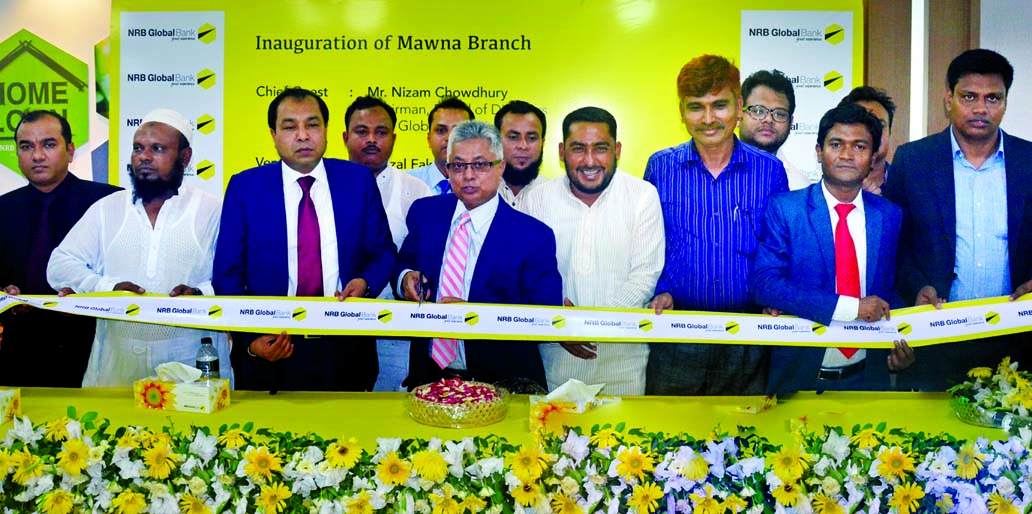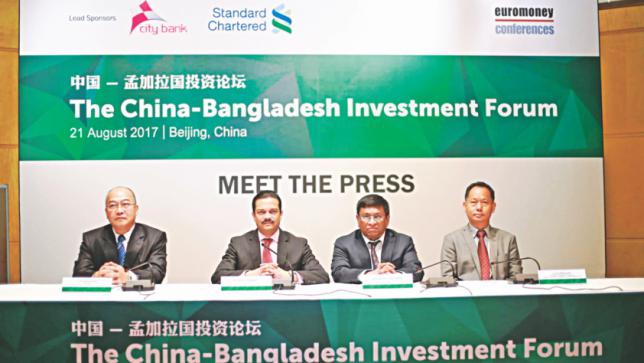Standard Chartered and City Bank are set to organise a day-long symposium in China next month with a view to attracting foreign direct investment, much needed as Bangladesh looks to scale up its economy.
“Now is a good time to make investment in Bangladesh,” said Lin Weiqiang, president of the Chinese Chamber of Commerce in Bangladesh, which represents about 80 percent of the Chinese enterprises in the country.
The reasons are the impressive economic growth clocked in by the country over the past decade or so, the current government's commitment to development and the vast labour resource, he said.
“Economic exchange between China and Bangladesh became more vigorous since the Awami League government came to power,” said Lin.
His comments came at a press briefing yesterday to announce the 'China-Bangladesh Investment Forum', held at the capital's Westin hotel.
To be held in Beijing on August 21, the conference will look to: present the business prospect for Chinese investors in the country and the incentives being offered by the government, and identify ways to harness the opportunities being generated by China's landmark 'One Belt One Road' initiative. Proposed by Chinese President Xi Jinping in 2013, the OBOR involves building roads, rails, ports, pipelines and other infrastructure joining China to Central Asia, Europe and Africa by land and sea. So far, 68 countries have signed up for it.
“The Belt and Road initiative has the potential to bring in a new era of prosperity for the region and we want to be a humble part of this vast possibility,” said Abrar A Anwar, chief executive officer of Standard Chartered Bangladesh.
The Asia-focused bank has been involved in nearly 10 deals related to the OBOR initiative, he added.
“With increasing economic cooperation with China, Bangladesh can truly benefit from the opportunities arising out of the OBOR initiative,” said Sohail RK Hussain, managing director and CEO of City Bank.
Owing to the strong economic and social development, more and more Chinese companies are looking at Bangladesh with keen interest, especially after the state visit of the Chinese premier last year, said Li Guangjun, the economic and commercial counsellor to the Chinese embassy in Dhaka.
While he lauded the initiative behind the forthcoming event, he hopes the prospective Chinese investors are informed of the bottlenecks such as transport and sluggish customs clearance in Bangladesh.
“Give them the full and realistic picture,” he said, adding that the two countries have similar characteristics: populous and short on natural resources.
China has grown exponentially in the past 40 years because of the reforms taken by the government. “This experience can be shared with Bangladesh.”
Bangladesh's edge in labour-intensive industries appeals to China as it shifts to technology-intensive industries.
Li went on to express his frustration about the delay in materialisation of the one-stop service for foreign investors as promised by the Bangladesh government.
“For one-and-a-half years I have been hearing about the one-stop service but it is not ready yet. The good intentions should be put to action,” he added.
Lin echoed the same, saying there is an urgent need for the one-stop service.
“We have such facilities in each province in China, big or small. Otherwise, it is very frustrating. Our investors here are going to BIDA one day, the NBR the following day, and the industries ministry the next. It takes a lot of time.”
The red tapism in Bangladesh is the main concern for Chinese investors, he added.
Hussain of City Bank said the forum in Beijing would facilitate such dialogue on a greater scale between the two parties such that the full potential of the bilateral relationship can be realised at the earliest.
Bangladesh's leather, garment, food and agriculture, and light engineering sectors present great opportunity for Chinese investors, he said.
As of now, 137 Chinese investors have signed up for the forum, according to Hussain.
Finance Minister AMA Muhith; Kazi Aminul Islam, executive chairman of the Bangladesh Investment Development Authority; Mohd Habibur Rahman Khan, executive chairman of the Bangladesh Export Processing Zone Authority; Mohammed Ayub, secretary of the Bangladesh Economic Zones Authority; and Syed Afsor H Uddin, chief executive officer of the Public-Private Partnership Authority, would be carrying the government's message to the Chinese investors.
This is the seventh such international investment forum co-hosted by City Bank and Standard Chartered, previously held in Singapore, Hong Kong and London.
News:Daily star/25-jul-2017



 Nizam Chowdhury, Chairman of
Nizam Chowdhury, Chairman of 
